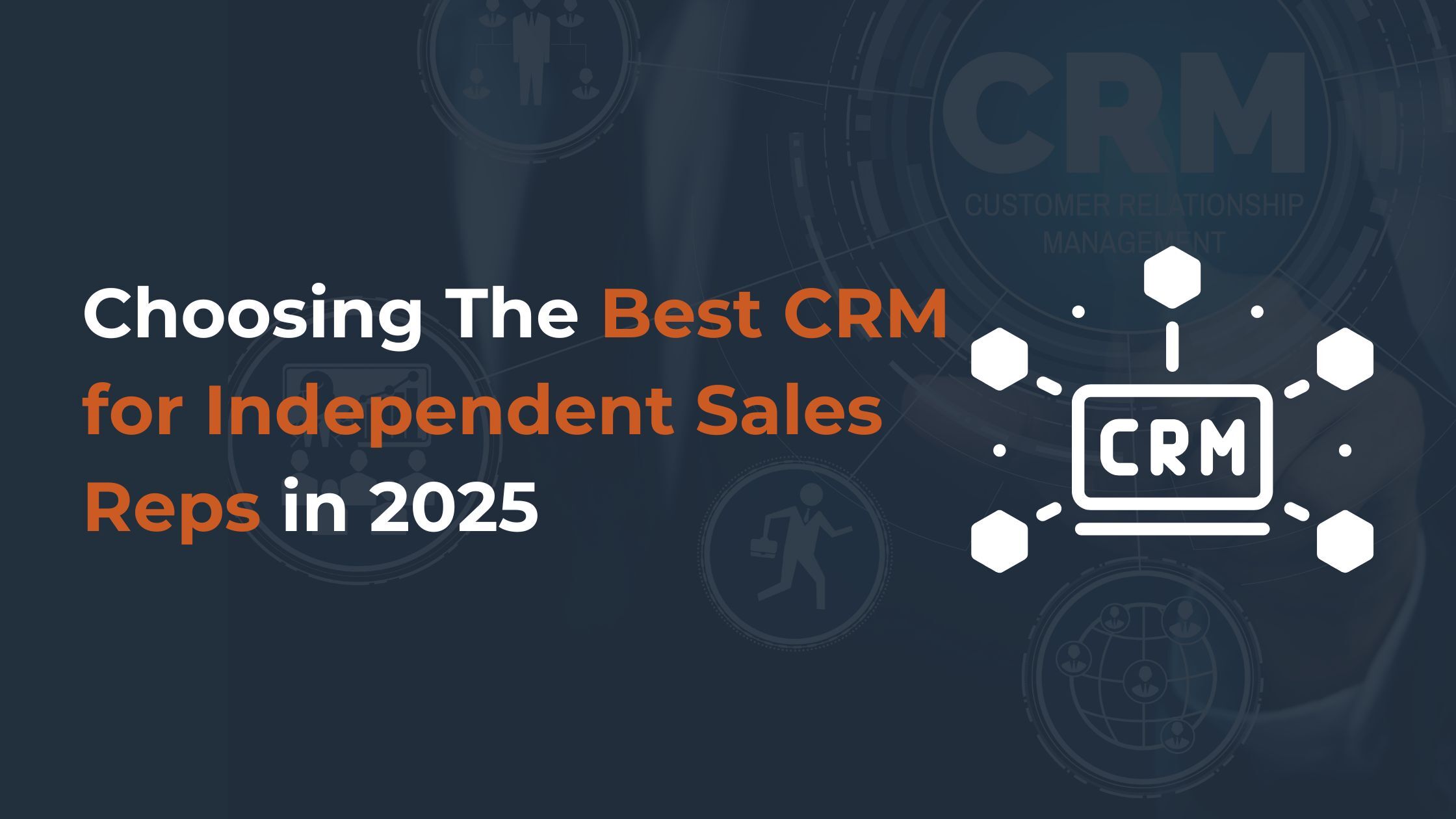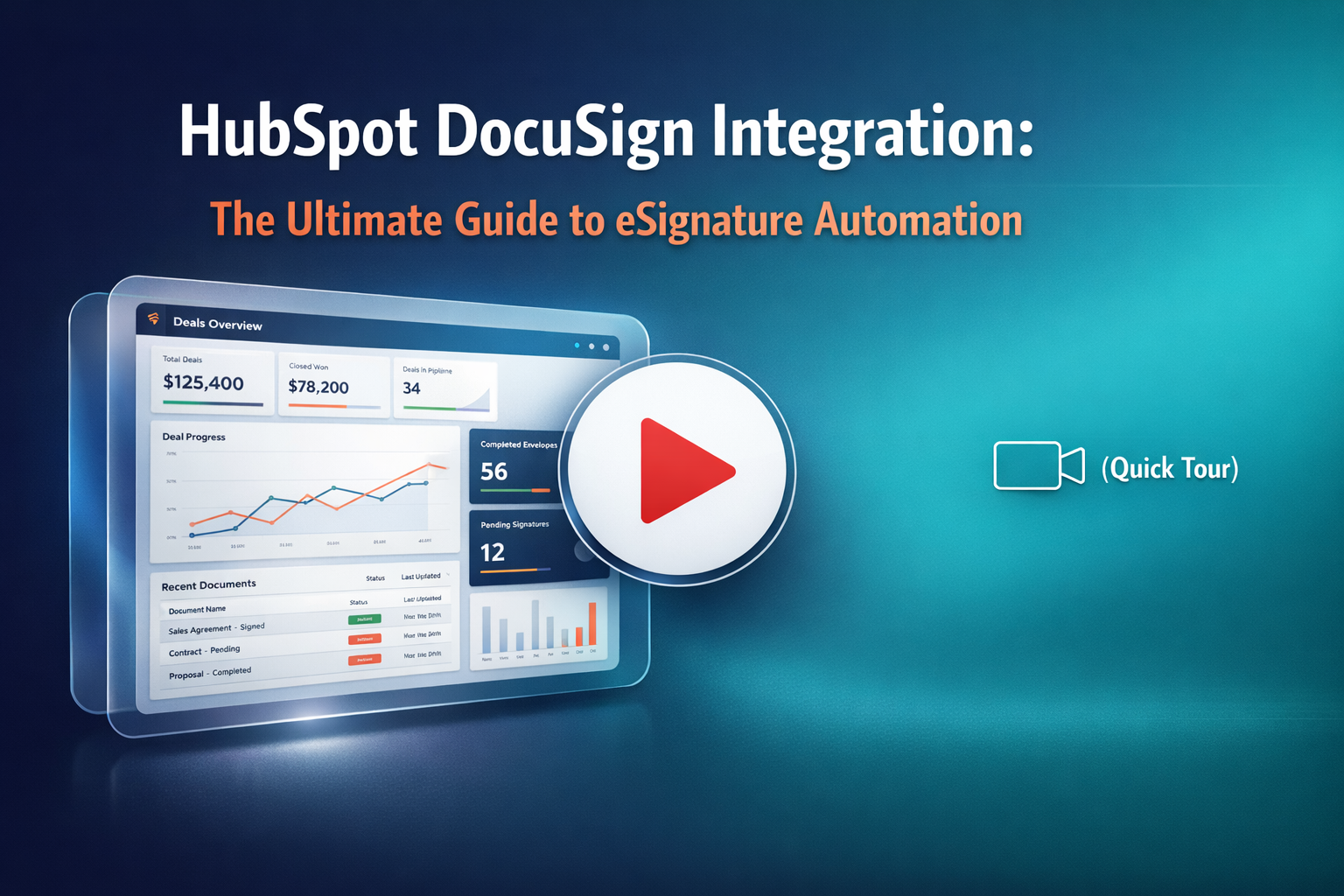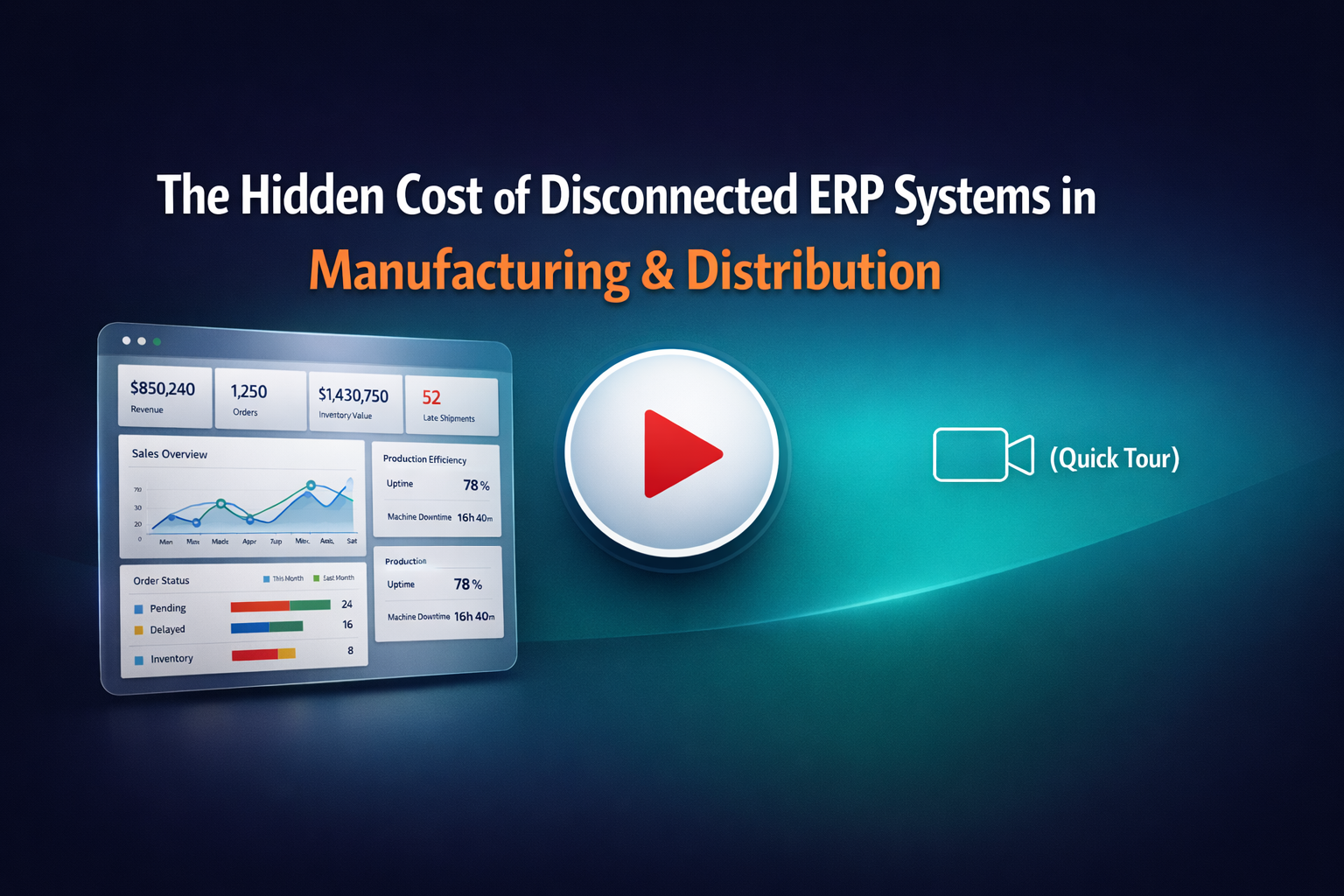Table of Content
- What Independent Sales Reps Need from a CRM
- Comparing CRM Tools: What Fits Your Solo Workflow
- Affordable CRM Software Options for Freelancers
- Integrating HubSpot CRM with Your Existing Sales Tools
- Mobile-Friendly CRM Solutions for On-the-Go Reps
- Future-Proofing Your Solo Sales Process with CRM
- Customization Tips for Adapting CRM to Your Sales Style
- FAQ
What Independent Sales Reps Need from a CRM

Independent sales reps often juggle multiple clients, long sales cycles, and diverse pipelines without the support of a large sales team. Unlike big organizations with dedicated CRM admins, solo reps need a tool that’s lightweight, cost-effective, and simple enough to manage on their own while still providing powerful insights. A good CRM for sales reps should act as a digital assistant: keeping contacts organized, tracking deals, reminding reps of follow-ups, and automating routine tasks so they can focus on selling.
Overview of CRM Options Suitable for Individual Sales Reps
The market offers a wide spectrum of CRMs, from enterprise-level platforms like Salesforce and Microsoft Dynamics to lightweight solutions such as Pipedrive, Capsule, or HubSpot Starter. For independent reps, the sweet spot is often a CRM that balances affordability with functionality (contact management, email integration, pipeline tracking, and mobile access). Cloud-based CRMs are especially attractive because they’re easy to set up, require little technical expertise, and can scale as the rep’s book of business grows.
Challenges for Independent Reps Without a CRM
Without a CRM, independent sales reps face real productivity and revenue challenges:
- Disorganized contacts: Spreadsheets and notes lead to missed opportunities and forgotten follow-ups.
- Lack of visibility: It’s challenging to determine which deals are nearing completion and which prospects are lagging.
- Time wasted on admin: Manually tracking conversations, invoices, and reminders eats into selling time.
- Missed insights: Without reporting or analytics, it’s hard to identify which strategies are working.
Mistakes to Avoid When Choosing a CRM as a Solo Rep
Many independent reps fall into traps when selecting their first CRM. Common mistakes include:
- Overbuying features: Paying for advanced enterprise tools they’ll never use.
- Ignoring usability: Choosing a CRM that’s powerful but too complex for daily use.
- Skipping mobile access: Failing to prioritize on-the-go functionality, even though sales reps often work in the field.
- Neglecting integrations: Selecting a CRM that doesn’t sync with their email, calendar, or invoicing tools.
The best CRM for sales teams should feel like a natural extension of a rep’s workflow, not a burden. For solo professionals, simplicity, affordability, and efficiency should guide the decision.
Comparing CRM Tools: What Fits Your Solo Workflow
When evaluating the best CRM for sales as an independent sales rep, it’s important to find a balance between functionality and simplicity. Some platforms are designed for large enterprises with dedicated IT staff, while others are more flexible and lightweight, making them a better fit for individual professionals. Below, we’ll take a closer look at how five well-known platforms fit into the solo sales workflow.
HubSpot

HubSpot is one of the most popular CRM platforms globally, and for good reason. Its free CRM has become a favorite among independent reps, offering tools to manage contacts, track sales, log communications, and set reminders without spending a dime. The interface is clean, intuitive, and doesn’t require training to get started. HubSpot also integrates seamlessly with Gmail, Outlook, and other productivity apps, which is a big win for reps who spend a lot of time in their inbox. For those who need more, HubSpot’s paid Sales Hub adds automation, reporting, and advanced deal management. The main drawback is that the costs rise quickly once you move past the free tier.
Pros:
- Free plan available with strong core CRM features
- Easy to set up and use, even for non-technical reps
- Scales well as your business grows
- Strong integrations with email, calendar, and marketing tools
Cons:
- Advanced features get expensive
NetSuite
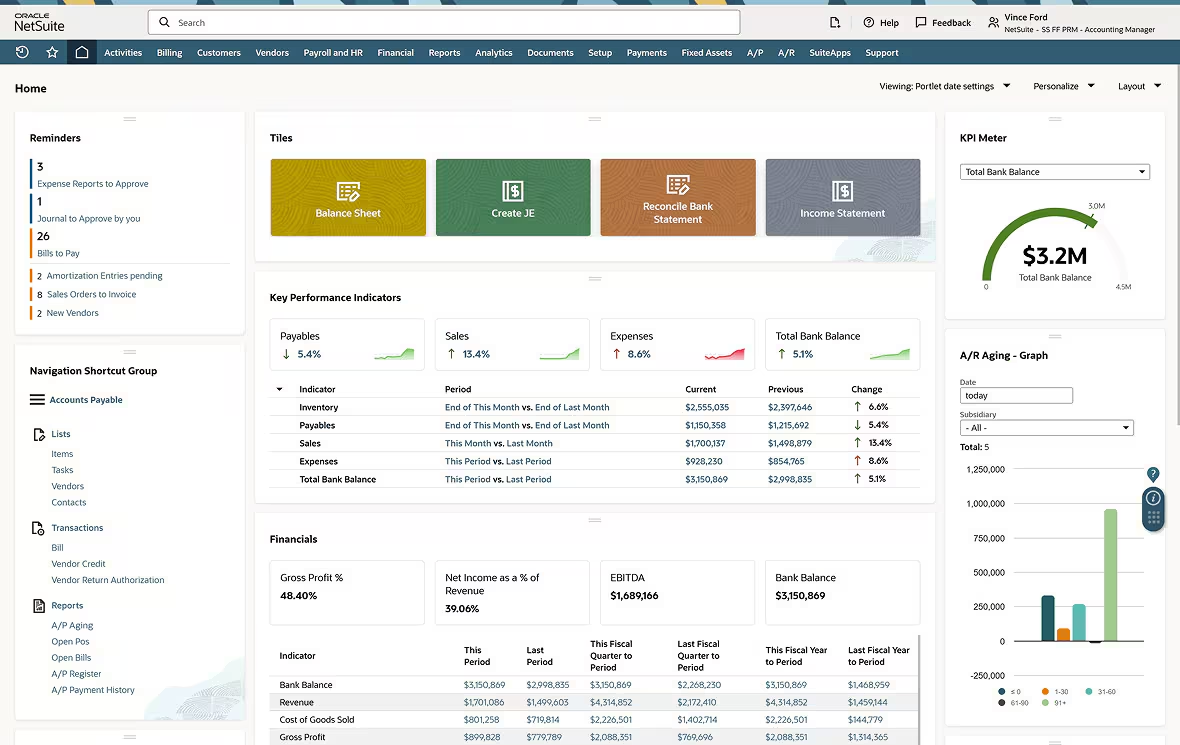
NetSuite, owned by Oracle, is primarily known as an ERP (Enterprise Resource Planning) platform, though it does include a CRM component. It’s designed for large, complex businesses that need to unify finance, operations, inventory, and sales under one system. For independent reps, the sheer scope of NetSuite makes it feel overwhelming. Implementing NetSuite often requires consultants, training, and a significant budget. However, if you’re running a solo consultancy with enterprise clients and need visibility into financials and supply chains alongside sales, it could technically work. Still, most solo reps will find it far more than they need.
Pros:
- Comprehensive suite with CRM, ERP, and financial tools
- Highly customizable for complex businesses
- Trusted by large organizations worldwide
Cons:
- Very expensive and resource-heavy for solo reps
- Steep learning curve, requires training or IT support
- Features exceed the needs of most individual sales professionals
Snowflake

Snowflake isn’t a CRM in the traditional sense. It’s a cloud-based data warehouse platform built to help companies store and analyze massive amounts of data. For independent sales reps, that means it’s not something you’d use directly to manage your contacts or deals. Instead, Snowflake could serve as a backend solution for reps who want advanced data insights by connecting it with a front-end CRM. For example, if you work with analytics-heavy industries or manage multiple data sources, Snowflake might allow you to pull custom reports and insights. However, it requires technical knowledge and usually works best in combination with other tools.
Pros:
- Excellent for advanced analytics and reporting
- Scales seamlessly for large datasets
- Can integrate CRM data into custom dashboards
Cons:
- Not a CRM, requires pairing with another tool
- Requires technical knowledge and setup
- Overly complex for everyday sales management tasks
Epicor

Epicor is a long-standing ERP provider that offers CRM functionality as part of its larger suite. Its CRM tools are most useful in industries like manufacturing, distribution, and retail, where sales processes are tied closely to supply chain and inventory management. Epicor can provide deep insights when your deals are connected to stock availability, production timelines, or customer purchase histories. However, if you’re an independent rep working in services, consulting, or general B2B/B2C sales, the platform will likely feel heavy and unnecessarily complex. The implementation and cost also make it impractical for most solo reps.
Pros:
- Strong fit for industry-specific needs (manufacturing, retail, distribution)
- Good integration of CRM with supply chain and inventory
- Flexible deployment (cloud or on-premise)
Cons:
- Too complex for generalist independent reps
- Higher cost compared to lightweight CRMs
ConnectWise

ConnectWise is a specialized platform designed for IT service providers, managed service businesses, and technology consultants. Unlike traditional CRMs, it combines sales management with ticketing, project management, service desk tools, and billing. This makes it powerful if your work involves both selling and delivering IT services, since it unifies client data, service contracts, and workflows in one place. For independent reps outside of IT, however, ConnectWise may feel bloated because it includes features irrelevant to general sales. Still, if you’re a solo professional in the tech sector, it could be a very practical all-in-one system.
Pros:
- Great fit for IT-focused independent reps
- Combines CRM with service management and billing tools
- Strong automation for recurring service tasks
Cons:
- Features are very specialized for IT/tech
- Can feel bloated if you only need core CRM functionality
Affordable CRM Software Options for Freelancers
For freelancers and independent sales reps, cost is often just as important as functionality. Unlike enterprise sales teams with big budgets, solo professionals need the best CRM for sales reps that deliver strong value without straining monthly expenses. The good news? In 2025, there are several affordable CRM platforms designed specifically for freelancers, consultants, and small business owners.
Zoho CRM

Zoho CRM is one of the most budget-friendly yet robust solutions on the market. This CRM offers flexible pricing tiers, starting with a low-cost plan that includes lead management, workflows, and email tracking. Zoho’s mobile app makes it easy for freelancers to manage deals on the go, while its integrations with other Zoho apps help streamline back-office work.
Why it’s good for freelancers:
Affordable, feature-rich, and easy to scale as your client base grows.
Capsule CRM

Capsule CRM is designed for simplicity. It focuses on the essentials: contact management, pipeline tracking, and task reminders. Freelancers love it for its clean interface and straightforward pricing without steep learning curves or unnecessary extras. Capsule also integrates with Google Workspace and Microsoft 365, making it a natural fit if you already use those platforms.
Why it’s good for freelancers:
Lightweight, intuitive, and keeps client data organized without complexity.
Pipedrive

Pipedrive is a favorite among solo sales professionals who prefer visual pipeline management. Its drag-and-drop interface makes it easy to see where every deal stands, while automation features reduce manual admin work. Although slightly more expensive than Capsule, its focus on sales productivity and closing deals makes it worth the investment for many independent reps.
Why it’s good for freelancers:
Visual pipeline tracking and automation help freelancers stay on top of opportunities.
Freshsales

Freshsales, part of the Freshworks ecosystem, offers an affordable CRM with AI-powered insights, email sequencing, and workflow automation. For freelancers who want to experiment with sales automation without committing to a high-cost platform, Freshsales is a strong option. Its tiered plans allow you to start small and expand as needed.
Why it’s good for freelancers:
Budget-friendly automation and AI insights to make solo selling more efficient.
Insightly

Insightly is a solid choice for freelancers who also handle project management alongside sales. It combines CRM functionality with project tracking tools, making it ideal for consultants or freelancers who manage long-term client projects. While its interface is more complex than Capsule or Pipedrive, it offers strong value for professionals juggling both sales and delivery.
Why it’s good for freelancers:
All-in-one CRM and project management, perfect if you wear multiple hats.
Integrating HubSpot CRM with Your Existing Sales Tools
One of the biggest advantages of HubSpot CRM for independent sales reps and freelancers is how seamlessly it integrates with the tools you already use every day. Instead of forcing you to change your entire workflow, HubSpot enhances it, bringing contacts, tasks, emails, and deals into one connected platform. Here’s how HubSpot CRM supports solo professionals through practical features:
Lead and Contact Management
HubSpot makes it effortless to capture, store, and organize all your leads and client contacts in one place. You can import existing spreadsheets, sync contacts from your email, or use web forms to automatically feed prospects into your database. Each contact profile provides a full history of emails, calls, notes, and meetings, ensuring you never lose context.
Task and Activity Tracking
For independent reps, follow-ups can make or break a deal. HubSpot’s task management keeps you on track by allowing you to schedule calls, send reminders, and log activities directly within the CRM. You’ll always know what needs to be done next and can prioritize your day around the most important actions.
Sales Pipeline Visualization
The visual pipeline in HubSpot lets you see exactly where each deal stands. You can customize pipeline stages to match your sales process and move opportunities forward with a simple drag-and-drop interface. This clear visibility makes it easier to forecast revenue and focus your efforts on the deals most likely to close.
Mobile Access and Notifications
HubSpot’s mobile app ensures you’re never out of the loop. Whether you’re in a client meeting, traveling, or working remotely, you’ll have access to your contacts, tasks, and deals. Push notifications alert you to new leads, upcoming tasks, or important email replies, helping you stay responsive and proactive.
Integration with Email and Calendars
HubSpot integrates directly with Gmail, Outlook, and other major email providers. This means you can log emails automatically, track when prospects open your messages, and schedule meetings without leaving the CRM. Calendar sync ensures you never double-book and that all client interactions are neatly organized.
Customizable Fields and Workflows
No two independent sales reps work the same way. HubSpot allows you to create custom fields to track the data that matters most for your business, whether that’s project type, referral source, or contract value. Workflows can automate repetitive tasks like sending follow-up emails or updating deal stages, saving you valuable time.
Reporting and Performance Analytics
HubSpot’s built-in reports give you insights into your performance, even on the free plan. You can track deal progress, conversion rates, and activity levels, helping you identify what’s working and where you need to adjust. For reps who want deeper analytics, the paid plans unlock customizable dashboards and advanced reporting.
Easy Setup and User-Friendly Interface
Perhaps the biggest selling point of HubSpot for solo professionals is its simplicity. Getting started takes minutes and the interface is designed for clarity. Unlike enterprise CRMs that require training or IT support, HubSpot feels intuitive, letting you focus more on selling and less on managing software.
If you want to go beyond the basics and connect HubSpot with other sales or marketing platforms you already use, that’s where SyncMatters comes in. Our integration services ensure your best CRM for sales reps is not just set up, but fully connected with other useful tools. With SyncMatters, you can build a seamless sales ecosystem that eliminates manual work and helps you stay focused on growth.
Mobile-Friendly CRM Solutions for On-the-Go Reps
Independent sales reps rarely spend their entire day at a desk. Whether you’re traveling to client meetings, attending events, or working from different locations, having mobile access to your CRM is essential. In 2025, the best CRMs don’t just offer a mobile app; they deliver a full-featured mobile experience that keeps you productive wherever you are. Here are some top mobile-friendly and comprehensive CRM solutions for solo professionals:
HubSpot CRM

HubSpot’s mobile app gives independent reps everything they need at their fingertips: contact records, deal pipelines, tasks, and even AI-powered call logging. Notifications ensure you never miss a follow-up, and the app’s offline mode allows you to access key sales data without an internet connection.
Best for: Reps who want a free, intuitive mobile CRM that integrates seamlessly with email and calendars.
Pipedrive
Pipedrive’s mobile app is designed with a focus on pipeline management. Its visual interface translates perfectly to mobile, letting you update deals with a simple swipe or tap. The app also includes activity reminders and quick call logging, which is great when you’re moving between meetings.
Best for: Reps who prefer a visual, drag-and-drop pipeline to stay on top of deals.
Zoho CRM

Zoho’s mobile app brings strong functionality, including lead capture, task tracking, and location-based services. For example, you can check into meetings, get directions, or view nearby prospects. It’s a powerful option for freelancers who want advanced features without a heavy price tag.
Best for: Freelancers who need location-based features and integrations with other business tools.
Freshsales

Freshsales offers a mobile app with AI-powered deal insights, voice notes, and one-tap calling. It’s ideal for reps who want to balance sales with automation on the go. The app syncs in real time, so you’re always aligned with your desktop version, no matter where you work.
Best for: Reps looking for automation and smart insights on mobile.
Capsule CRM

Capsule’s mobile app focuses on simplicity. It provides quick access to contacts, opportunities, and tasks without clutter. For solo reps who value an easy-to-use tool that doesn’t overwhelm with features, Capsule is a clean and practical choice.
Best for: Freelancers who want a lightweight mobile CRM to organize contacts and tasks.
Future-Proofing Your Solo Sales Process with CRM
Today, clients expect faster responses, more personalization, and seamless communication across channels. For independent sales reps, this means relying on outdated methods is no longer enough. The best CRM for sales reps positions your business to adapt, grow, and thrive in the future.
Embracing Automation and AI
Future-ready CRMs are increasingly powered by automation and artificial intelligence. From automated follow-up reminders to AI-driven lead scoring, these tools help solo reps save time and focus on the opportunities most likely to convert. By adopting a CRM with built-in automation, you’ll stay ahead of competitors who are still doing everything manually.
Building a Scalable Sales System
Even if you’re working independently now, your client base may expand. A CRM ensures your process is ready to handle more deals, more contacts, and more communications without added stress. Instead of overhauling your workflow later, you’ll already have a system in place that grows with you.
Staying Connected Anywhere
The future of sales is mobile and flexible. With cloud-based CRMs offering real-time sync and mobile access, you can work from anywhere without losing track of your pipeline. Whether you’re meeting clients in person or managing deals between flights, your CRM becomes your portable sales office.
Integrating Your Sales Ecosystem
The best CRM software for sales reps doesn’t operate in isolation. It connects with your email, calendar, invoicing, and marketing tools to create a unified workflow. With integration services like those from SyncMatters, independent reps can ensure every tool works together seamlessly. This level of integration not only saves time but also reduces the risk of errors and missed opportunities.
Customization Tips for Adapting CRM to Your Sales Style

No two independent sales reps work the same way. Some focus on high-volume prospecting, while others build deep, long-term relationships with a smaller client base. The beauty of modern CRM systems is that they’re not one-size-fits-all; you can tailor them to match your unique sales style.
Define Your Sales Stages
Start by customizing your pipeline stages to reflect how you actually sell. Instead of using generic steps like “Lead – Opportunity – Closed,” adapt them to your workflow (e.g., “Initial Outreach – Demo Scheduled – Proposal Sent – Negotiation – Won/Lost”). This makes your pipeline a more accurate reflection of your sales reality.
Personalize Data Fields
Generic CRMs come with standard fields like “Name,” “Email,” and “Company.” But your sales style may require tracking additional information, such as industry type, referral source, budget range, or renewal dates. Adding custom fields helps you capture the data most relevant to your deals.
Automate Repetitive Tasks
If you find yourself sending the same follow-up emails or updating similar tasks over and over, use your CRM’s workflow automation. Set up rules to automatically create tasks after a new lead comes in, send reminders for contract renewals, or trigger thank-you emails after a deal closes. Automation keeps you consistent without extra effort.
Create Custom Dashboards
Every rep tracks success differently. Some care most about the number of new leads, while others want to see revenue forecasts or activity volume. Building a custom dashboard ensures that the metrics most important to your sales style are always front and center.
Leverage Tags and Segmentation
Organize your contacts in a way that makes sense for you. Use tags, lists, or segments to group clients by priority, region, product interest, or deal stage. This makes it easier to filter contacts and tailor your outreach.
Use Templates That Reflect Your Voice
Most CRMs allow you to save email templates, call scripts, or proposal formats. Customizing these ensures that every touchpoint reflects your personal sales style, while still saving time by reusing proven messages.
Keep It Simple
One of the most common mistakes reps make is over-customizing their CRM until it becomes overwhelming. Add the fields, dashboards, and automations you truly need. You can always expand later, but the goal is to make your CRM a natural extension of your workflow.
FAQ
What are the essential CRM tools for solo sellers?
Independent reps don’t need enterprise-level complexity. The essentials include contact management, a clear sales pipeline, task reminders, and email/calendar integration. Mobile access is also critical so you can manage deals on the go.
Can I use a CRM without a team?
Absolutely. Many CRMs are designed specifically for individual users and freelancers.
How much should I spend on CRM software?
As a solo seller, you don’t need to overspend. Budget-friendly options start at $0–$15/month, with more advanced plans ranging up to $40–$50/month. The right spend depends on your workflow, upgrade only when you need extra features.
Do I need technical skills to set up a CRM?
No. The best CRM software for sales reps is designed for ease of use, with simple onboarding, drag-and-drop pipelines, and guided setup. You don’t need coding knowledge, though integration partners like SyncMatters can help if you want a more tailored setup.
How can CRM improve my daily sales routine?
A CRM keeps you focused by organizing contacts, automating reminders, and tracking progress. Instead of digging through emails or spreadsheets, you’ll have a single hub that shows exactly where each deal stands.
What’s the best way to try a CRM before buying?
The safest route is to start with a free trial or free plan. Test it with real leads, tasks, and emails to see if it matches your workflow.
